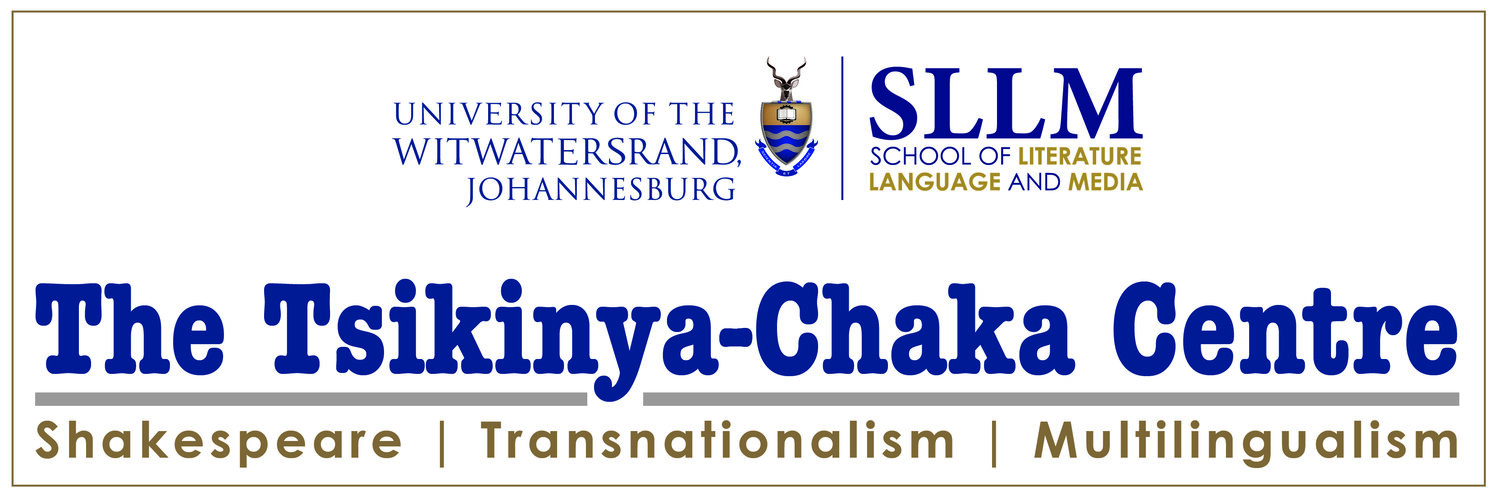CFP: Shakespeare Towards An End
The Tsikinya-Chaka Centre is pleased to announce its inaugural conference, which will be co-hosted with the Shakespeare Society of Southern Africa.
CALL FOR PAPERS
The theme of this conference emphasises Shakespeare as a means to various ends: that is, Shakespeare as a vehicle that gets us somewhere else.
From travelling Shakespeare to Shakespeare as a locus of activism and advocacy: Shakespeare – the historical figure, the body of work – is acknowledged as a traveller who has journeyed far beyond his place of birth and whose work has been taken in directions he could not have foreseen. In recent years, Shakespeare scholars, teachers and theatre- or film-makers have increasingly prioritised such destinations. Other ‘ends’, too, have become the primary objects of study, the creative focus or the locus of activism: racial justice; economic inequality; sexuality and gender, as well as gender-based violence; decolonisation and neocolonialism; globalisation and transnationalism; language advocacy and multilingualism.
Shakespeare as transportation / Being transported by Shakespeare: As alternately (or simultaneously) traveller and mode of transportation, Shakespeare remains of interest and value to us; yet, although useful, as a vehicle Shakespeare is neither irreplaceable nor indispensable. Or is he?
Exploring histories, legacies and languages other than (or other to) Shakespeare’s: For teachers and creative practitioners, Shakespeare may facilitate (but may also present a barrier to) responses to a specific place or historical moment other than Shakespeare’s. For translators, Shakespeare may enable (but may also undermine) the promotion of languages other than Shakespeare’s. Political, economic or social justice projects may even be understood as other to Shakespeare.
Journeys beyond the familiar: Our concern is to track the impact of Shakespeare’s travels, as well as our own journeys beyond the familiar – to consider the capacity of contemporary global Shakespeare practice to effect discomfiting critique. What new perspectives and new meanings, as well as new uncertainties, have these travels given rise to? There are also ethical questions to pose about creative practice and Shakespeare scholarship in the context of an ever more interconnected world where circuits of creative or scholarly exchange follow familiar global hierarchies – potentially reproducing patterns of injustice, even as we seek to resist and complicate those patterns.
New lines of solidarity: Whose ends, then, does Shakespeare serve? The centre or the margins, the well-resourced or the under-resourced, the global north or the global south? When does Shakespeare help to build south-south or south-north solidarity, and when does it/he reinscribe established power imbalances and conflicts? Insofar as such questions rely on increasingly outmoded relational concepts – categories that become scrambled or reconstituted as we take seriously the journeys that ‘Shakespeare’ has undertaken – how can we go beyond the implications of what have previously been thought of as centre and periphery? What and where are these new ‘ends’?
Border crossings, migrations, translations: Paying attention to border crossings in/and/through Shakespeare, or perhaps ‘borderline Shakespeares’, leads to further questions. What forms of translation have been made possible or made necessary as a result of these traversals and migrations? When it comes to adaptation and appropriation, where does Shakespeare ‘begin’ and ‘end’? Is Shakespeare taking us somewhere, or are we taking Shakespeare with us? Who is doing the driving?
Subversion, resistance, belonging: Shakespeare has been used to challenge authority and to seek justice, but his work is recruited towards bolstering the status quo as often as it is towards subversion or resistance. Either way, communities of practice around the world have laid claim to Shakespeare’s works and have found value and resonance in the encounter. Once Shakespeare is invoked, alluded to or borrowed from – even when parodied or critiqued – does the ‘gravity’ of Shakespeare always prevail? In other words, does reading or performing or teaching Shakespeare always inevitably become, in one way or another, an end in itself?
By calling for critical reflection on the expansive and expanding world of Shakespeare studies, the conference theme also asks, finally: what would it mean for Shakespeare to ‘come to an end’?
We invite abstracts for 20-minute papers and presentations, to be submitted by 9 December 2022. Proposals for panels and roundtables are also welcome.
Please email the convenors, Sandra Young and Chris Thurman, with submissions and queries.
The congress will include seminars, themed sessions and plenary addresses as part of an academic conference, in addition to workshops and other events.
ABOUT THE VENUE
The Manor House at Spier
A lakeside view
Ophelia (Nandipha Mntambo, Spier Light Art Festival, 2022)
The Dying Slave (Marco Cianfanelli and artists from the Spier Arts Academy)








